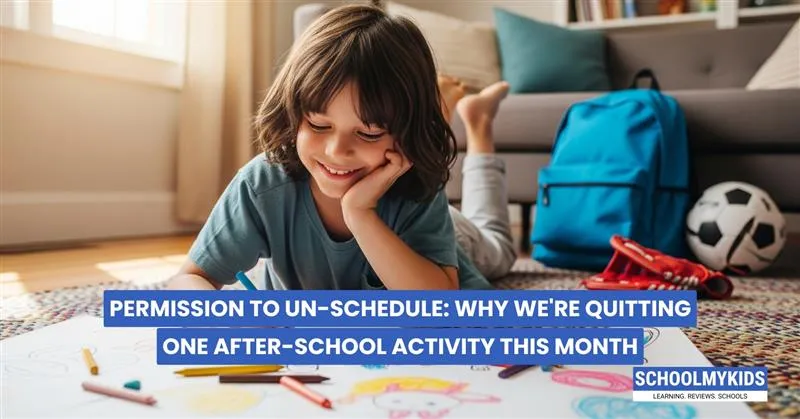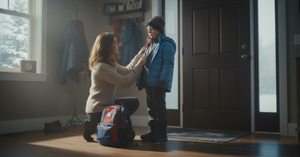It's Tuesday at 4:30 PM, and you're sitting in your car in the parking lot of the music academy, engine running, scrolling through your phone while your child finishes piano lessons. In twenty minutes, you'll drive across town for soccer practice. Tomorrow it's tutoring, Thursday is art class, and don't even think about the weekend tournament schedule.
Your kid looks tired. And so do you.
When did childhood become a full-time job? When did we start believing that a free afternoon meant we were failing as parents?
Maybe it's time to do something that feels both scary and liberating: quit one of those activities. Give your kids permission to un-schedule. It might be the best gift you can give them.
The Pressure Cooker of Modern Parenting
Kids today have schedules that would make a CEO dizzy. Walk into any elementary school pickup line, and you'll hear parents handling multiple after-school activities.
"Diya has violin, then tuition, then gymnastics," one mom tells another. "What about Jay?" "Oh, he's got cricket, coding class, and French tutoring."
You nod along because this is normal now. This is what good parenting looks like, right?
Wrong.
Somewhere along the way, we bought into the idea that more equals better. More activities equal more opportunities. More opportunities equal better chances at success. Better chances at success equal good parenting.
But here's what nobody talks about: your kids are drowning in opportunities.
The Culture That Created This Mess
The pressure doesn't come from nowhere. We live in a culture that's terrified of kids being "behind." Social media shows us highlight reels of other families' achievements. School newsletters celebrate students who've made the traveling team, won the science fair, and mastered three instruments by age ten.
Then there's the college admission anxiety that starts way too early. You hear stories about kids who need extracurricular activities just to get into a decent college. So you panic and sign them up for everything, just in case.
The message is clear: idle time is wasted time. Rest is laziness. If your child isn't constantly improving, they're falling behind.
But what if that message is completely wrong?
What Overscheduling Really Does to Kids
We're seeing more anxious, burned-out children than ever before. Kids who should be playing and exploring are instead managing calendars like tiny adults.
The signs are everywhere if you're willing to see them. Kids who melt down over small things because they're overtired. Children who've lost the ability to entertain themselves. Families who eat dinner in the car more often than at home.
Research shows that overscheduled kids struggle with:
- Higher levels of anxiety and depression
- Difficulty with self-regulation and emotional control
- Less creativity and independent thinking
- More family stress and conflict
- Sleep problems and physical exhaustion
Studies found that children with an excessive number of structured activities per week showed increased signs of stress and decreased academic performance.
The Hidden Costs Nobody Talks About
Beyond the emotional toll, there are costs you might not always consider. Family dinners become impossible when everyone's rushing to different activities. Siblings barely see each other. You become a chauffeur instead of, well, a parent.
Between driving time, waiting time, and the activities themselves, you might be spending 18+ hours a week on after-school commitments. That's almost a part-time job.
The financial cost is real too, but the relationship cost is what really matters. You and your child might be spending more time in the car together than actually talking at home.
Why Rest and Unstructured Time Matter
Remember being a kid and having nothing to do? Remember the creativity that came from those empty hours? Building forts, inventing games, reading for hours, or just thinking?
Your kids need that too. Unstructured time teaches them:
- How to entertain themselves
- How to make their own decisions
- How to be comfortable with quiet
- How to process their experiences
- How to discover their own interests
When every minute is planned, kids never learn to plan for themselves. They become dependent on external structure and lose the ability to create their own meaning and fun.
How to Say No Without Guilt
Quitting feels hard because we've made it about giving up instead of choosing priorities. Here's how to reframe it:
- Start with your values. What do you actually want for your family? More time together? Less stress? Kids who know how to relax? Write it down and refer back to it when you feel guilty.
- Saying no to one activity means saying yes to another. You're not choosing nothing over piano; you're choosing family dinner over piano. You're choosing afternoon bike rides over piano. You're choosing a less stressed kid over piano.
- Talk to your child honestly. Ask what they actually enjoy versus what they feel they should do. You might be surprised by their answers.
- Set a limit and stick to it. One activity per child per season. Two max if they're older and genuinely passionate about both. Having a rule makes it easier to say no to new opportunities.
- Ignore the other parents. Their choices don't have to be your choices. Their priorities don't have to be your priorities.
Managing FOMO (Fear of Missing Out)
The fear is real: what if you're making a mistake? What if this was the activity that would have changed everything for your child?
Here's the truth: there will always be another opportunity. Piano lessons exist next year too. Soccer teams will still need players in the spring. But childhood only happens once.
The opportunities your kids are missing by being overscheduled might be bigger than the ones you're afraid they'll miss by quitting:
- The opportunity to develop self-direction
- The opportunity to rest and recharge
- The opportunity to have deeper relationships with family
- The opportunity to discover their own interests
- The opportunity to be a kid
Practical Tips for Un-Scheduling
- Start small: You don't have to quit everything at once. Pick one activity that's causing the most stress or that your child seems least interested in.
- Try a trial period: Tell your child (and yourself) that you're taking a break for a month to see how it feels. This makes it feel less permanent and scary.
- Have a family meeting: Talk about what you want your afternoons and weekends to feel like. Get everyone's input.
- Build in downtime gradually: If you're used to a packed schedule, suddenly having lots of free time can feel weird. Add it slowly.
- Resist the urge to fill empty time immediately: Sit with the spaciousness for a while. Let your family get used to a slower pace.
- Find other families doing the same thing: You're not alone in wanting to slow down. Connect with like-minded parents for support and playdates.
Conclusion
This isn't about being anti-activity or anti-achievement. It's about being pro-childhood and pro-family. It's about recognizing that your kids have their whole lives to be busy. They only have a few years to be kids.
So what activity could you quit this month? What would it feel like to have Tuesday afternoons free? What would your family gain by choosing less instead of more?
The piano will be there next year if your child wants it. But this Tuesday afternoon, this moment of childhood, this chance to breathe, that's only here right now.
Sometimes the best thing you can do as a parent is get out of the way and let your kids figure out who they are when no one's telling them what to do next.








Be the first one to comment on this story.